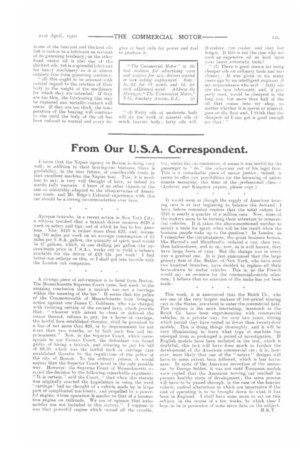From Our U.S.A. Correspondent.
Page 5

If you've noticed an error in this article please click here to report it so we can fix it.
I learn that the Napier agency in Boston is doing very well; in addition to their touring-car business, there is probability, in the near future, of considerable trade in that excellent machine the Napier taxi. This, it is needless to say, is very well thought of here, as indeed its merits fully warrant, I know of no other chassis of the size so admirably adapted to the idiosyncrasies of American roads, and Mr. Edge's Colonial experience with this car should be a strong recommendation aver here.
Apropos taxicabs, in a recent action in New York City, a witness testified that a taxicab driver receives $110 a week in salary and tips, out of which he has to buy gasolene. Now, $110 is rather more than 7E22, and, assuming 700 miles per week on an average consumption of 15 miles per U.S.A. gallon, the quantity of spirit used would be 47 gallons, which, at one shilling per gallon (the approximate price in U.S.A.), works out to yield a balance available for the driver of £19 12s. per week! I had better not enlarge on this, or I shall get into trouble with the London cab companies.
A strange piece of information is to hand from Boston. The Massachusetts Supreme Court came, last week, to the amazing conclusion that a taxicab was not a carriage within the meaning of thelaw ! It seems that the police of the Commonwealth of Massachusetts were bringing action against one James C. Goldman, who was charged with violating certain of the revised laws, which provide that.: " whoever with intent to cheat or defraud the owner thereof, refuses to pay, for a horse or carriage, the lawful fare established therefor, shall be punished by a fine of not more than $20, or by imprisonment for not more than two months, or by both such fine and imprisonment." Now, in the Superior Court, which corresponds to our County Court, the defendant was found guilty of hiring a taxicab, and refusing to pay his bill of $8.50, which was the lawful hack or carriage fare established therefor by the regulations of the police of the city of Boston. To the ordinary person, it would appear that the Superior Court acted in the only possible way. However, the Supreme Court of Massachusetts reversed the decision by the following remarkable argument: " It is certain.'' said the Court, " that when this statute was originally enacted the Legislature in using the word
carriage' had no thought of a vehicle made up in large part of complicated machinery, and propelled by a powerful engine, whose operation is similar to that of a locomotive engine on railroads. We are of opinion that automobiles are not included in this statute." I suppose it was that powerful engine which caused all the trouble,
but, under the circumstan('es, it seems it was lawful for the passenger to" do " the cab-owner out of his legal fare. This is a remarkable piece of motor justice; indeed, it seems to offer new possibilities for the harassing of unfortunate motorists, this time of the professional class.— (Audover and Kingston papers, please copy.) It would seem as though the supply of American touring cars is at last beginning to balance the demand: I have before reminded readers that the total output for 1910 is nearly a quarter of a million cars. Now, more of the makers seem to be turning their attention to commercial vehicles. If it takes the above-mentioned number to satisfy a taste for sport, what will be the result when the business people wake up to the position? In London. as I remember the circumstances, the great business houses, like Harrod'e and Shoolbred's, ordered a van, then two, then half-a'-dozen, and so on: now, as is well known, they have large fleets of vans. But the change was in every -way a gradual one. it is just announced that the large grocery firm of Jas. Butler, of New York, who have over two hundred branches, have decided to replace a// their horse-drawn by motor vehicles. This is, as the French would say, an occasion for the commercial-vehicle salesmen ; I believe that no selection of the make has yet been made.
This week, it is announced that the Buick Co., who are one of the very largest makers of low-priced touring cars in the States, are about to enter the commercial field. This venture is the more interesting, inasmuch as the Buick Co. have been experimenting with commercial vehicles, in a private way, for over two years, during which period they have tested no fewer than twenty-four models. This is 'doing things thoroughly, and it will be very illuminating to learn what type of machine has emerged from so prolonged a period of investigation. If English models have been included in the test, which is doubtful, this fact will have done much to further the development of the American commercial ear; it is, however, most likely that one of the " native'' designs will have to some extent been followed, which is less fortunate. In spite of the American invention of the motorcar, hiGeorge Selden, it was not until European models were copied that the American touring car reached its present healthy state of development; the same process will have to be passed through. in the case of the heavier vehicle, radical alterations in which are imperative if the cost of operating is to be brought down to what it has been in England. I shall have some more to say on this subject, in the course of a few weeks, by which time I hope to be in possession of some more data on the subject..




















